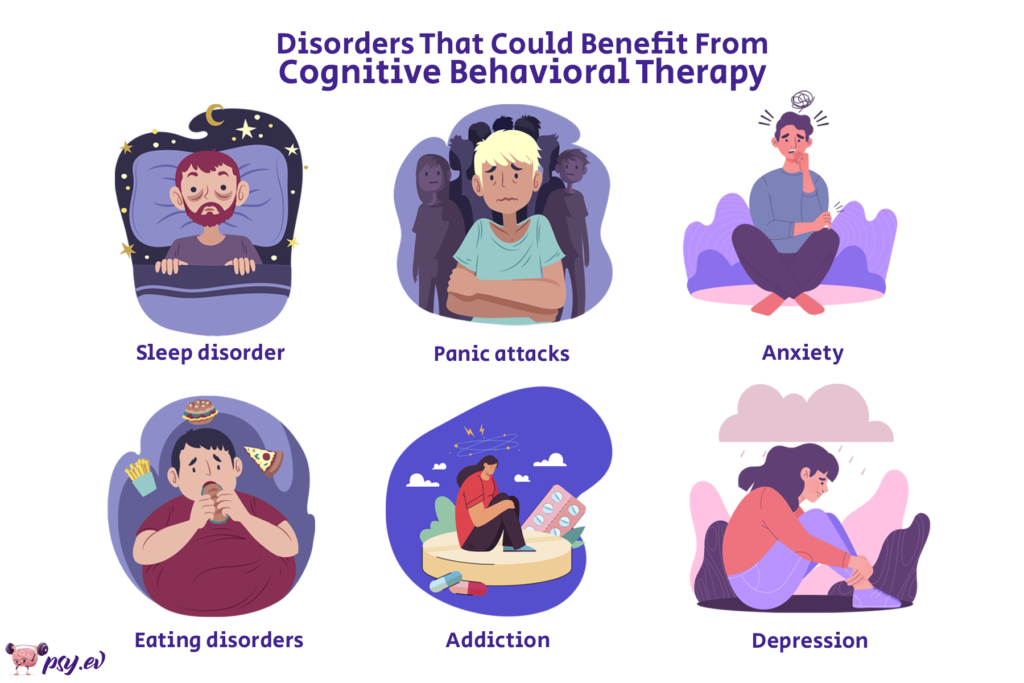Cognitive behavioral therapy (CBT) is a type of talk therapy that has been shown to be incredibly effective in treating a wide range of mental health conditions, from depression and anxiety to eating disorders and substance abuse. CBT works by helping you understand and change the negative thoughts and beliefs that are at the root of your distress.
How Does CBT Work?
CBT focuses on the present moment and teaches you how to identify and challenge the negative thoughts that are keeping you stuck. By learning how to reframe these thoughts in a more realistic and positive light, you can start to see the world around you in a new way. This, in turn, can help reduce your distress and improve your overall well-being.
CBT is usually delivered in weekly sessions that last for 50 minutes each. These sessions may be conducted individually or in group settings, depending on your needs. In some cases, CBT may also be delivered via computer or phone if you are unable to attend in person.

If you are struggling with the mental health conditions listed above, We urge you to take our online tests on the following disorders:
Types of Cognitive Behavioral Therapy
Cognitive behavioral therapy usually focuses on one specific problem area. However, there are different types of CBT that can be used to treat different conditions. Some of the most common types of CBT include:
• Dialectical behavior therapy: This type of CBT is commonly used to treat borderline personality disorder and other mental health conditions that involve impulsivity and emotional dysregulation.
• Exposure therapy: This type of CBT is used to treat conditions like anxiety disorders and phobias. It involves gradually exposing yourself to the thing you are afraid of in a safe and controlled environment.
• Cognitive processing therapy: This type of CBT is used to treat posttraumatic stress disorder. It helps you to process and make sense of your trauma in a safe and healthy way.
• Rational emotive behavior therapy: This type of CBT is used to treat conditions like depression and anxiety. It focuses on helping you to identify and challenge the negative thoughts that are keeping you stuck.
What Cognitive Behavioral Therapy Can Help With
Cognitive behavioral therapy has been shown to be an effective treatment for a wide range of mental health conditions. Some of the conditions that CBT can help with include:
• Anxiety disorders: It has been shown to be an effective treatment for all types of anxiety disorders, including social anxiety disorder, panic disorder, and generalized anxiety disorder.
• Depression: It can help break the negative thought patterns that are associated with depression and improve your overall mood.
• Eating disorders: It can help you develop a healthy relationship with food and your body. It can be used to treat conditions like anorexia nervosa, bulimia nervosa, and binge eating disorder.
• Substance abuse: It can help you to manage your triggers and cravings, and develop healthier coping mechanisms for dealing with stress and emotions.
• Posttraumatic stress disorder: It can help you process and make sense of your trauma in a safe and healthy way.
• Obsessive-compulsive disorder: It can help you manage your obsessions and compulsions in a more healthy and productive way.
In addition to mental health conditions, cognitive behavioral therapy (CBT) has also been helpful to people coping with:
• Chronic pain: It can help you manage your pain in a more productive way.
• Sleep problems: It can help you develop healthier sleep habits and improve the quality of your sleep.
• Relationship issues: It can help you identify and change the negative thought patterns that are damaging your relationships.
• Work-related stress: It can help you develop healthier coping mechanisms for dealing with work-related stress.
Benefits of Cognitive Behavioral Therapy
Cognitive behavioral therapy can offer a number of benefits. Some of the ways CBT can help include:
• Changing negative thought patterns: One of the most common benefits of CBT is that it can help you to identify and change the negative thoughts that are keeping you stuck.
• Improving communication skills: CBT can help you to develop better communication skills. This can be helpful in both personal and professional relationships.
• Developing healthier coping mechanisms: CBT can help you to develop healthier ways of coping with stress and difficult emotions.
• Improving self-esteem: CBT can help you to develop a more positive view of yourself.
• Reducing symptoms of mental health conditions: CBT has been shown to be an effective treatment for a wide range of mental health conditions.
• Improving quality of life: CBT can improve your overall quality of life by helping you to cope with difficult situations in a more productive way.
Things to Consider With Cognitive Behavioral Therapy
Cognitive behavioral therapy can be an effective treatment for a wide range of mental health conditions. However, there are a few things to consider before starting CBT:
Cost
Cognitive behavioral therapy can be expensive, especially if you see a private therapist. However, many insurance plans cover at least some of the cost of CBT.
Time commitment
It usually requires weekly sessions for a period of several months. This can be difficult to fit into a busy schedule.
Effort
It requires you to be actively involved in your treatment. This means that you will need to do homework assignments and practice the skills you learn in therapy.
Therapist experience
It’s important to find a therapist who is experienced in treating the specific condition you are dealing with.
How to Get Started With Cognitive Behavioral Therapy
Consult with your physician or mental health professional
To see if CBT is right for you. If it is, they can refer you to a qualified therapist in your area. You can also search for a Cognitive Behavioral Therapist through the American Association of Cognitive and Behavioral Therapists.
Consider your personal preferences and needs
When choosing a therapist. For example, some people prefer to see a male or female therapist, while others don’t have a preference. You may also want to consider the therapist’s experience, approach, and location or whether you prefer face-to-face or online therapy.
Contact your health insurance provider
To find out if CBT is covered under your plan. If it is not, ask about the cost of private therapy.
Make an appointment
This is an opportunity for you to ask questions and decide if the therapist is a good fit for you.
Show up to your first session prepared
CBT requires effort and commitment from both the therapist and the client.
What to Expect With Cognitive Behavioral Therapy
Cognitive behavioral therapy usually consists of weekly 50-60 minute sessions. The number of sessions you need will depend on your specific goals and the severity of your condition.
During CBT, you will work with your therapist to identify the thoughts and behaviors that are keeping you stuck. You will then learn new skills for dealing with these thoughts and behaviors. These skills will be practiced in sessions and through homework assignments.
CBT can be a challenging process, but it can also be very rewarding. With hard work and commitment, CBT can help you to develop new ways of thinking and behaving that will improve your overall quality of life.
